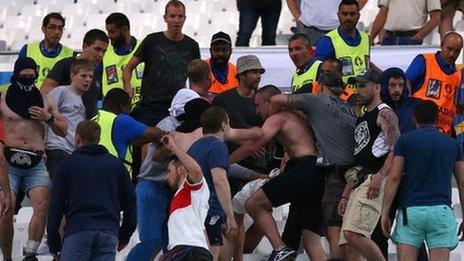Press review: Blame split on Marseille football violence
- Published

The full-time whistle brought violence to the Stade Velodrome
The violence before and after Saturday's Euro 2016 match between England and Russia has led newspapers in Britain to worry that football is "headed back to the dark ages", with blame split between Russian and English troublemakers.
The 1-1 draw is the top story on Russian online media, with the last-minute equaliser by the national team being celebrated as a virtual victory.
But Russia's press largely deflected blame for post-match scuffles on to English supporters or the organisers, glossing over the Russian fans' charge at the English seats after the game.
French media resigned itself to the fact that violence between the two sets of supporters was perhaps inevitable, swinging the spotlight onto organised gangs of Russian fans.

The Sun's front page juxtaposes a bloodied fan with England captain Wayne Rooney, looking bewildered after opponents Russia equalised at the end of Saturday's game.
UK press: "Not like ordinary fans"
The Sun on Sunday lays blame for post-match fighting on Russian fans. The paper quotes England supporters as saying Russians involved in the clashes "weren't like ordinary fans - they were all like bodybuilders and meant to cause us serious harm".
Daily Star Sunday says English supporters were "ambushed by Russian hooligans", but does not ignore English involvement in pre-match violence. It quotes a local politician as saying: "I hope that when the bill for damage has been completed their country will contribute to the cost."
The Mail on Sunday asks "Back in the dark ages?" after the violence. "Memories of a draw they snatched from the jaws of victory against Russia will mingle with recollections of chairs flying through the air, hooligans scattering around the Vieux Port and snarling faces," Oliver Holt writes.

"Drama at Marseille port, or what it means to wake the Russian bear!" says Russia's Life News website
Russia: "They came to fight"
Russian media was split on whom to blame for the brawls. While most held the English fans largely at fault, others pointed the finger at their Russian counterparts and the French organisers.
Popular Russian news website Gazeta.ru, external called the result "Russia's miraculous rescue". However, the main headline was: "These people are not fans. They came to fight" which, according to the site, was "provoked by English fans".
"Such behaviour is typical of English fans," a correspondent for state-owned channel Rossiya 24 said. Gazprom-owned NTV built on that idea further, saying that it was "no accident that both 'football' and 'hooligan' are English words".
Venerable Russian sports news site Sovetsky Sport, external said: "What to do on a Saturday morning? Drink beer, get a tan, then go and fight with police, throw chairs and glass bottles. What could be better for English fans?"
Pro-Kremlin news portal Life.ru , externalwas almost jubilant in its coverage of the fighting at Marseille port during the day, noting that it "began with many provocations by the English fans" and "ended with the latter making a cowardly retreat from the field of battle".
Curiously, Russian sports news portal Sport Express , externalreported that the Marseille port brawl had involved only "England fans and local Arabs" with no Russian presence.
Moscow daily free newspaper Vechernyaya Moskva, external, in an article headlined "No-holds-barred fighting at the Velodrome", noted that fans exchanged insults throughout the match, while at full-time "around 30 Russian fans broke into the English sector and started a fight… Yes, of course, the English are to blame. Why did they shout insults at Russia, Putin and, for some reason, Sharapova? And ours, you could say, answered them."
The paper went on to blame the organisers. "We have all heard about the unprecedented security measures taken by France in response to the raised terror threat. Well, where are they?"
However, the BBC's Russian service speculates that the Sharapova insults, picked up widely in the Russian press, were sourced from a since discredited fake news account.

"Shame" says the front page of L'Equipe sports newspaper
France: Organised violence
Some French newspapers noted that the post-match violence appeared pre-planned by organised gangs of Russian hooligans.
In sports newspaper L'Equipe,, external Ronan Evian wrote: "The term 'hooligan' is not inappropriate to describe the Russians who fought yesterday. These are real, die-hard types." Well-trained and well-organised, "they gathered to do what they do not do at home: fight in the city streets," Evian wrote.

How the French newspaper Le Parisien portrayed the violence
Le Monde , externaldaily largely agreed. Among Russian fans, the paper said, were "small, well-organised gangs, such as about 30 fans of FC Lokomotiv Moscow, wearing the colours of Orel Butchers, a well-known group in the country, who repeatedly charged at English fans with extreme violence".
But as Liberation , externalpointed out, both sides were responsible for violent scenes in the city. "Before going to Stade Velodrome to attend the match, fans from the two sides played cat and mouse with riot police in the streets near the Old Port," the paper said.
Le Parisien, external thought that violence was inevitable. "England-Russia, a high-risk match we knew about", the daily said.
BBC Monitoring, external reports and analyses news from TV, radio, web and print media around the world. You can follow BBC Monitoring on Twitter , externaland Facebook, external.
- Published12 June 2016
